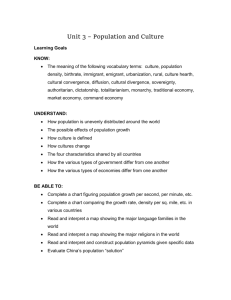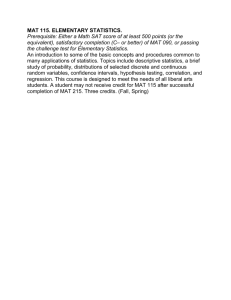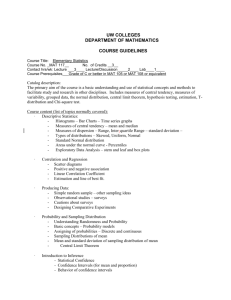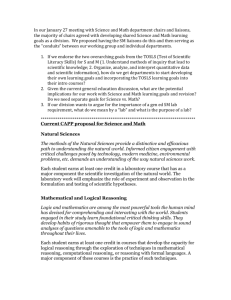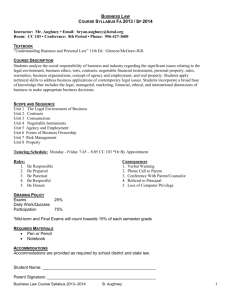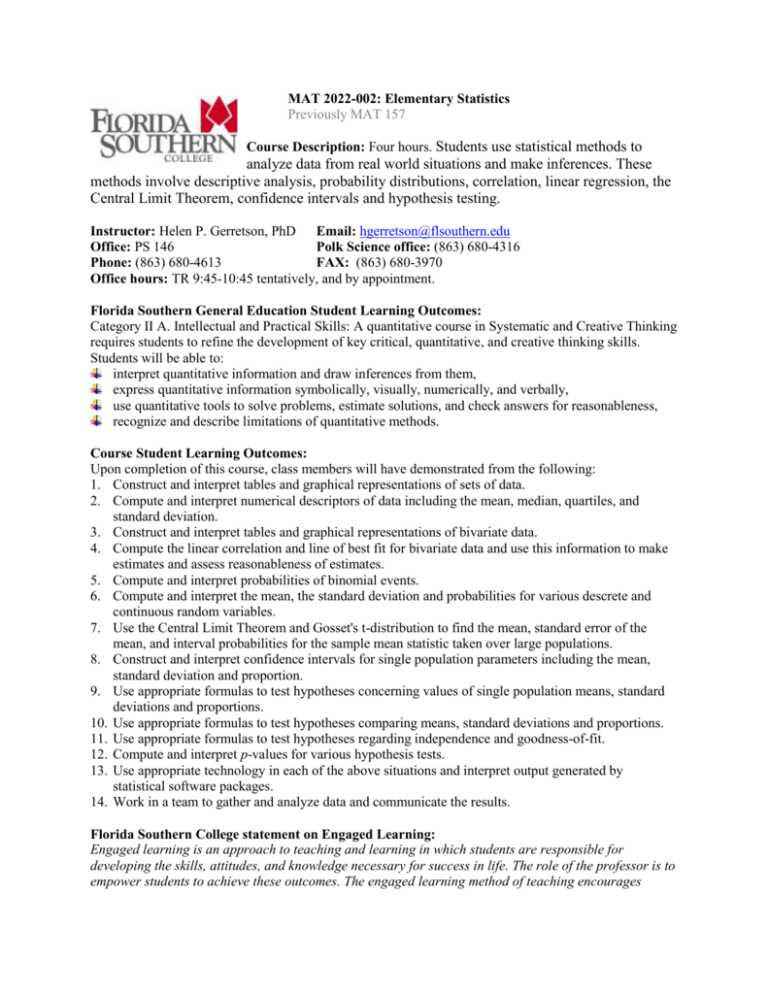
MAT 2022-002: Elementary Statistics
Previously MAT 157
Course Description: Four hours. Students use statistical methods to
analyze data from real world situations and make inferences. These
methods involve descriptive analysis, probability distributions, correlation, linear regression, the
Central Limit Theorem, confidence intervals and hypothesis testing.
Instructor: Helen P. Gerretson, PhD Email: hgerretson@flsouthern.edu
Office: PS 146
Polk Science office: (863) 680-4316
Phone: (863) 680-4613
FAX: (863) 680-3970
Office hours: TR 9:45-10:45 tentatively, and by appointment.
Florida Southern General Education Student Learning Outcomes:
Category II A. Intellectual and Practical Skills: A quantitative course in Systematic and Creative Thinking
requires students to refine the development of key critical, quantitative, and creative thinking skills.
Students will be able to:
interpret quantitative information and draw inferences from them,
express quantitative information symbolically, visually, numerically, and verbally,
use quantitative tools to solve problems, estimate solutions, and check answers for reasonableness,
recognize and describe limitations of quantitative methods.
Course Student Learning Outcomes:
Upon completion of this course, class members will have demonstrated from the following:
1. Construct and interpret tables and graphical representations of sets of data.
2. Compute and interpret numerical descriptors of data including the mean, median, quartiles, and
standard deviation.
3. Construct and interpret tables and graphical representations of bivariate data.
4. Compute the linear correlation and line of best fit for bivariate data and use this information to make
estimates and assess reasonableness of estimates.
5. Compute and interpret probabilities of binomial events.
6. Compute and interpret the mean, the standard deviation and probabilities for various descrete and
continuous random variables.
7. Use the Central Limit Theorem and Gosset's t-distribution to find the mean, standard error of the
mean, and interval probabilities for the sample mean statistic taken over large populations.
8. Construct and interpret confidence intervals for single population parameters including the mean,
standard deviation and proportion.
9. Use appropriate formulas to test hypotheses concerning values of single population means, standard
deviations and proportions.
10. Use appropriate formulas to test hypotheses comparing means, standard deviations and proportions.
11. Use appropriate formulas to test hypotheses regarding independence and goodness-of-fit.
12. Compute and interpret p-values for various hypothesis tests.
13. Use appropriate technology in each of the above situations and interpret output generated by
statistical software packages.
14. Work in a team to gather and analyze data and communicate the results.
Florida Southern College statement on Engaged Learning:
Engaged learning is an approach to teaching and learning in which students are responsible for
developing the skills, attitudes, and knowledge necessary for success in life. The role of the professor is to
empower students to achieve these outcomes. The engaged learning method of teaching encourages
MAT 2022-002 Elementary Statistics
learners to conduct meaningful inquiry, reflect, think critically, and develop learning strategies for
dealing with real-world challenges. Engaged learning may take place in a variety of settings using
approaches varying in complexity and tailored to diverse student learning styles.
Engaged learning activities, to develop all student learning outcomes, include activities such as:
verbal and written explanations of mathematical methods of problem solving,
small and large group discussion,
cooperative group work and collaboration,
quick quizzes,
MINITAB, SPSS, EXCEL, FATHOM and/or TI-84 graphing calculators to analyze data,
online applets and resources for statistics,
Classroom Presenter, TI-Smart View, Synchroneyes, and/or Qwizdom audience response
system to enhance classroom communication.
Course materials:
The required textbook is Larson & Farber (2012) Elementary Statistics: Picturing
the World, 5/E. Pearson Prentice Hall. In particular, homework exercises are directly
from the textbook.
There is an expectation that students are able to use rudimentary technology (Word,
Internet, etc.) or will obtain assistance to complete necessary tasks. Technology use
is always permitted; please note, however, that the student may be required to
demonstrate the inherent mathematical skill/concept since mastery is assumed in all
cases.
A graphing calculator is required for coursework related to statistical analysis. Students are responsible
for fundamental user knowledge of their calculator, as class time cannot be spent on learning the
technology. Calculator instruction will focus on utilizing the TI-84 Plus statistics capabilities. EXCEL is
available in the PS 205 classroom and will be used to support coursework related to statistical plots and
graphs, as well as linear regression.
Attendance/Participation:
The college Catalog states “Students are expected to attend all class and laboratory sessions on time and
may be absent only for unavoidable documented reasons.” It is the student’s responsibility to inform the
professor of an unavoidable absence and to complete all course work missed due to absence. For further
information see the College Catalog.
As such, it is your responsibility to keep in communication with the instructor regarding absenteeism.
Tardiness, as well as early exit, is considered in a similar fashion; three unexcused arrivals/departures are
equivalent to one absence. Whenever a student misses a session, it is the student’s responsibility to secure
the information missed or material distributed. Incompletes are rarely given and are permitted only in case
of extenuating circumstances that prohibit completion of the course. Under no circumstances will an
incomplete be given to a student who is failing the course.
Extra credit work is not an option; therefore, it is to your benefit to keep up with the coursework. The
final day for course withdrawal without an academic penalty is Friday, 21 March 2014.
Students are expected to conduct themselves as citizens of this academic community by positively
influencing the on-line classroom environment. Failure to demonstrate such conduct WILL impact a
student’s grade; I reserve the right to consider the final letter grade in light of civic misbehavior during
Dr. Gerretson
Spring 2014
MAT 2022-002 Elementary Statistics
class (e.g. participating in discussions extraneous to the class, are disruptive or inattentive or passive).
The student will be warned on the first offense. If the disruptive behavior continues, the student will be
asked to leave and an absence will be recorded for that day. If the behavior continues, further
enrollment in the class will be discussed with the department head and the academic dean.
Academic Honesty:
As an academic community, Florida Southern College is firmly committed to honor and integrity in the
pursuit of knowledge. Therefore, as a member of this academic community, each student acknowledges
responsibility for his or her actions and commits to the highest standards of integrity. In doing so through
this Honor Code, each student makes a covenant with the college not to engage in any form of academic
dishonesty, fraud, cheating, or theft. Further information on the Honor Code is available in the current
Catalog.
Cheating and/or plagiarism will result in an automatic zero (0) on the assignment and will be
reported to the academic dean. This may result in an F in the course, suspension or expulsion
from the college!! If you need assistance or have any concerns throughout this course, please
come see me before the situation escalates. If you need assistance outside of class, feel free to
contact me so that we may schedule a more convenient time for us to meet.
Students with Disabilities Accommodations Statement:
“It is the responsibility of the student to make his or her condition known to the college, to take the
initiative in requesting desired appropriate accommodations, and to have the pertinent diagnostic tests or
other professional evaluations to verify the need for academic accommodations.”
A release statement signed by the student is required each semester before documentation and requested
accommodations can be shared with a student’s instructors. For more information on how to apply for
accommodations, please contact the Psychological Testing Office, in person or online, at
http://www.flsouthern.edu/academics/students/disabilityservices.htm. If there are concerns about
accommodations decisions, students may request a review by contacting FSC Disability Compliance
Officer Dr. Marcie Pospichal, Associate Vice President for Student Support, Thrift Building (Main
Floor), mpospichal@flsouthern.edu – 863/680-4197.
Assignments:
All course assignments are designed to give students an opportunity to develop statistical concepts and skills.
I reserve the right to refuse to grade late assignments. Points will be deducted in the following manner:
20% of all points of the assignment are lost if not submitted by due date and time.
10% of all points of the assignment are lost for each day later than 24 hours after the due date and
time.
Any exception MUST be documented BEFORE the due date (the next class session), NOT before the
class session. An email message will suffice but approval should not be assumed. I will check my email,
minimally, Monday and Wednesday evenings, around 8 PM.
Method of evaluation:
Student learning is assessed through exams, homework, quiz questions, case study reports, and classroom
performance.
Exams are comprehensive in nature, as the material builds on previous learning. Format is closed
book and notes but you may have ONE sheet of paper with anything you like on BOTH sides. You
may request to take an exam early with my approval of your excuse; NO make-up exams will be given
for any reason. Exams are fixed as scheduled; plan accordingly to attend these sessions: February 4th,
February 25th, March 25th, April 8th, and April 29th.
Dr. Gerretson
Spring 2014
MAT 2022-002 Elementary Statistics
Homework is assigned daily and due the next session. Exercises from the textbook are posted on the
class session’s opening presentation slide, as well as the final slide.
There will be several open-notes quiz questions posed throughout each session as application of the
material presented. Quiz slides have a red line on the left.
Case study reports are to be handed in on an individual basis, although students may discuss the case
with classmates. Case studies are located in the textbook.
Participation entails entering the portal classroom prepared, engaging in classroom discussions and
activities, answering questions, and working with others to solve problems and complete tasks.
The instructor does not give grades, but rather reports grades. The grade each student earns is entirely
based on the number of points received. In case of unforeseen circumstances, the assessment weights may
be redistributed.
Points are accrued in the following manner:
Homework – 1 point for each correct response
Exams – 100 points each
Quizzes – 1 point for each correct response
Participation – up to 20 points (to be evaluated at the end of the semester)
Scoring is on the “percent” scale, with an A being 90% to 100% and an F being below 60%.
Dr. Gerretson
Spring 2014

